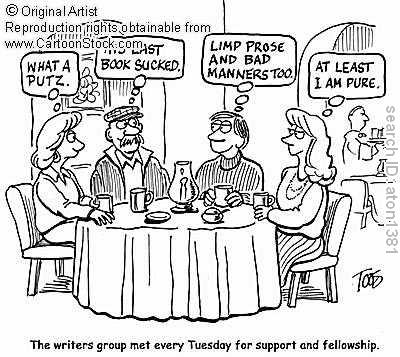To avoid criticism, do nothing, say nothing, and be nothing. – Elbert Hubbard
There are a few things that every writer should have. When you get down to it, that is a pretty substantial comment. Writing is largely individual and like many arts, is at least partially subjective. That being said, there are things we should all have in common.
First off is a copy of Strunk and White’s Elements of Style. If you don’t have it, get it. There are few books that address writing mechanics as efficiently as this one.
Second is something to write on.
Third is a good attention span. Writing is hard and takes up lots of time. Even when you aren’t writing, that attention span will allow you to go about the business of collecting. A writer is a sponge that soaks up the world around him. Phrases that are interesting, mannerisms, appearances, settings. Everything is stored for later use.
The fourth, is arguably the most important, and that is thick skin towards criticism. Do not shun criticism, welcome it. Nothing will make you a better writer than criticism. You are too close to your own writing. You infer things from its sentences that cannot be inferred. You understand things that cannot be understood. Things make sense that shouldn’t because your brain fills in the gaps. You need other people to tear apart your stuff.
Does it hurt? Of course it does. It hurts no less than a stranger saying your children are ugly. But it is important. You are going to get rejections. You are going to get criticized. With luck, you will be judged by thousands of people. Now is the time to get used to it. Lack of criticism in writing is lack of movement forward.
I was reminded this just recently after reading a self-published first novel by a writer new to fiction. I was excited to read the book because of several glowing reviews on Amazon calling it the next big thing. Unfortunately, it wasn’t. The book wasn’t bad, by any means. The concept was good, but the writing had a lot of technical issues and the story wasn’t consistent. This type of thing can only be caught by having your work read ahead of time by people who are willing to hurt your feelings and who worry about more than just your spelling.
Inconsistency to the rules of your story world cannot be allowed. Your characters must be true to themselves. Inefficient sentence structure is an easy fix. None of those things are necessary, nor should they make it to a final draft. Unfortunately, if you don’t know better, and no one is willing to tell you, how would you know? All of the five-star reviews are doing nothing for this writer, especially whereas the book is to be the first of a series. This is one of the dangers of self-publishing. If you don’t have the appropriate support group to read your work, you risk putting out bad fiction.
Unfortunately, my own review of this book was not appreciated. So it goes. I feel bad for the writer. I don’t feel bad that I said the writing was loose and needed an experienced editor or novelist to guide the writer’s next endeavor. I feel bad that the writer may not learn anything from it.
I’ve learned so much from those who have criticized my writing. I don’t mean insulted, but genuinely said what was wrong with it. I recently wrote a first draft that didn’t work. I knew it didn’t work and showed it to someone. They tore it apart. The re-write resulted in a focused, tighter piece that worked much better. If I had not had someone who was willing to be critical, the project could have been lost. Instead, I was able to submit it to an anthology.
Embrace other writers who are willing to be critical of you. Love them. If you don’t agree with what they say, don’t use it. But never downplay their usefulness. It might be the most important thing in your development as a writer.

